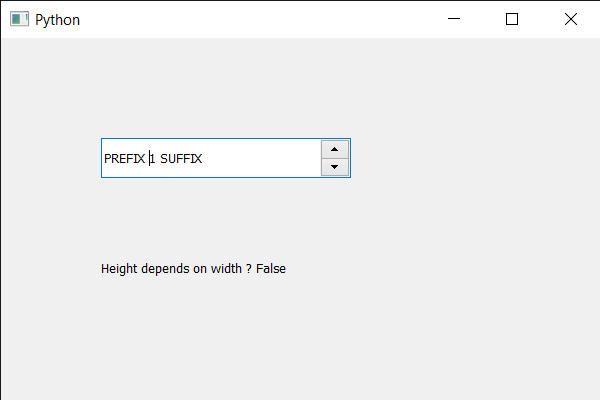En este artículo veremos cómo podemos verificar si la altura del cuadro de número depende del ancho del cuadro de número. La altura dependiendo del ancho significa que cada vez que cambia el ancho, la altura también cambia. Por defecto, la altura no depende del ancho.
Para hacer esto, usamos hasHeightForWidthel método con el objeto de cuadro de número.
Sintaxis: spin_box.hasHeightForWidth()
Argumento: no requiere argumento
Return : Devuelve bool
A continuación se muestra la implementación.
# importing libraries
from PyQt5.QtWidgets import *
from PyQt5 import QtCore, QtGui
from PyQt5.QtGui import *
from PyQt5.QtCore import *
import sys
class Window(QMainWindow):
def __init__(self):
super().__init__()
# setting title
self.setWindowTitle("Python ")
# setting geometry
self.setGeometry(100, 100, 600, 400)
# calling method
self.UiComponents()
# showing all the widgets
self.show()
# method for widgets
def UiComponents(self):
# creating spin box
self.spin = QSpinBox(self)
# setting geometry to spin box
self.spin.setGeometry(100, 100, 250, 40)
# setting range to the spin box
self.spin.setRange(1, 999999)
# setting prefix to spin
self.spin.setPrefix("PREFIX ")
# setting suffix to spin
self.spin.setSuffix(" SUFFIX")
# creating a label
label = QLabel(self)
# making the label multi line
label.setWordWrap(True)
# setting geometry to the label
label.setGeometry(100, 200, 200, 60)
# checking if height depend on the width
check = self.spin.hasHeightForWidth()
# setting text to the label
label.setText("Height depends on width ? " + str(check))
# create pyqt5 app
App = QApplication(sys.argv)
# create the instance of our Window
window = Window()
# start the app
sys.exit(App.exec())
Producción :
Publicación traducida automáticamente
Artículo escrito por rakshitarora y traducido por Barcelona Geeks. The original can be accessed here. Licence: CCBY-SA